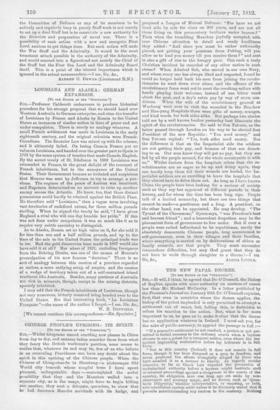CHINESE PEOPLE'S UPRISING: ITS SPIRIT. [To van EDITOR OP TRH
" Splarvroa."] Sin,—Whilst telegrams record startling new phases in China from day to day, and anxious ladies consider them from what they fancy the British workman's position, none seems to realize that, whatever its end may be, few of Us who believe in an overruling Providence can have any doubt about the spirit in this uprising of the Chinese people. When the Chinese of Chingeotieo-fu in Shantung—a picturesque Old 'World city beneath whose songful trees I have spent pleizeant, unforgettable days — contemplated the awful possibility that they and the Manchus walled into a separate city, as is the usage, might have to begin killing ono another, they sent a delegate, queuelese, to show that he had foraworn Maudlin servitude with its badge, and proposed a League of Mutual Defence: "For have we not lived side by side for close on 300 years, and are not all those living on this promontory brothers under heaven P" Then when the trembling Manchus joyfully accepted, with true Chinese attention to • detail and ready kindliness they added : "And since you must be rather awkwardly placed, not getting your pensions from Peking, will you allow us to lend you money till you receive them ?" and sent in also a gift of rice to the hungry poor. Can such a truly Christian incident be recorded of any other nation in ouch stress? When Admiral Salt, who served in our own Navy, and whom every one has always liked and respected, found he could no longer hold back his men from joining the revolu- tionaries he went down river alone, and the officers of the revolutionary force went out to meet the revolting sailors with bands playing their welcome, instead of one bitter word about the past, and a day's extra pay by way of stern con- ditions. When the wife of the revolutionary general at Wuchang went over to visit the wounded in the Han-how and Han-yang Hospitals there were gifts of money, oranges, and kind words for both sides alike. Bat perhaps two stories told me by a well known hanker yesterday best illustrate the spirit of the revolutionaries. He said to Sun Yat-sen, as the latter passed through London on his way to be elected first President of the new Republic : "You need money," and Sun Yat-sen replied: "Yes, both sides need money. But the difference is that on the Imperialist side the soldiers are not getting their pay, and because of that are desert- ing to us. Our men know they will get no pay, but they are fed by all the people around, for the whole countryside is with us." Whilst doctors from the hospitals relate that the re- volutionaries are so eager to be up and doing again, they can hardly keep them till their wounds are healed, the Im- perialist soldiers are so unwilling to leave the hospitals that they almost have to drive them out. As long as I have known China the people have been looking for a saviour of society such as they say has appeared at different periods in their history, and for whom the time has been long ripe. People talk of a limited monarchy, but there are two things that cannot be made—a gentleman and a king. A president, on the other hand, can be appointed. He may develop. "The Tyrant of the Chersonese," Byron says, "was Freedom's best and bravest friend" ; and a benevolent despotism may be the pleasantest form of government to live under. But if over a people were suited beforehand to be republicans, surely the absolutely democratic Chinese people, long accustomed to self-government, even in their villages and their fainilies, where everything is carried on by deliberations of elders or family councils, are that people. They must encounter tremendous difficulties, but may God grant that they do not have to wade through slaughter to a throne 1—I am






















































 Previous page
Previous page